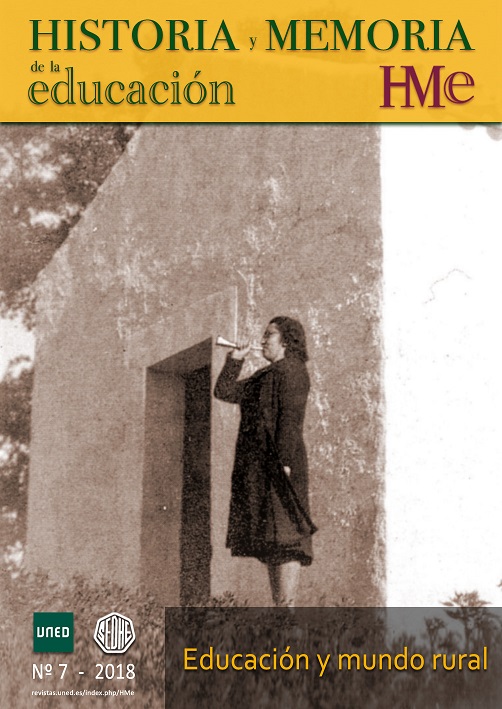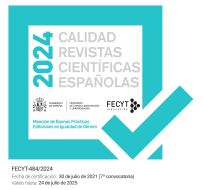From Chamber-School to the «President Trujillo» School. Spatial and genealogical transformations in the Dominican rural school, 1844-1944
DOI:
https://doi.org/10.5944/hme.7.2018.18726Keywords:
School space, social epistemology, public school system, power, genealogyAbstract
The historical transition referred to in this paper describes the development of the modern mass schooling system in the Dominican Republic. It was partially public in its republican beginnings, when it emerged from the heart of the teacher’s home space under the model we call chamber-school, an education provided by the state that would slowly move towards more complete forms of free access to school. Between the 1844 quasi-public chamber-schools and the «Presidente Trujillo» schools of the 1930-1961 dictatorship, citizens’ open and free access to public education took place, accompanied by a profound transformation of spatial and social relations that gave life to the school.
This paper analyzes the great transformation that the emergence of the «Presidente Trujillo» schools represented, as a school system based on a publicly- owned, isolated space, one which the rural population could access freely. Although we focus on the process of rural school spatial transformation, our main analytical interest lies in the configuration and change of social relationships that the development of public education entailed. We wish to understand both those relationships based on processes of power and interest derived from the articulation between the State and civil society; for example, those processes founded on the social epistemology that intended to regulate education during the first century of republican life of Dominican society (1844-1944).
Downloads
References
Acevedo, Ariadna. «Paying for Progress: Politics, Ethnicity and Schools in a Mexican Sierra, 1875-1930». PhD diss., Universidad de Warwick, 2004.
Alfonseca, Juan. «Escolarización y minorías étnicas en la República Dominica¬na, 1918-1944». Cuadernos Interculturales 6 (11), (2008): 17-45.
Alfonseca, Juan. «Escolarización y dictadura. La escuela rural y el encuadramiento del cam¬pesinado en la República Dominicana (1930-1940)». Boletín del Archivo Ge¬neral de la Nación 36 (130), (2011): 375-405.
Alfonseca, Juan. «A Public School System. Ensayo sobre un concepto en la representación im¬perial norteamericana sobre la escuela popular en las Antillas, 1898-1934». In El lenguaje de la educación: conceptos, metáforas y narrativas en los oríge¬nes de los sistemas educativos nacionales (c.1870-1930), edited by Eugenia Roldán Vera. Frankfurt am Main: Peter Lang.
Angulo A. J. Empire and Education. A History of Greed and Goodwill from the War of 1898 to the War on Terror. New York: Palgrave Macmillan, 2012.
Bosch, Juan. «Una escuela rural hace veinte años». Revista de Educación 6 (27), (1935): 70-73.
Brockliss, Laurence y Nicola Sheldon. «General Introduction». In Mass schoo¬ling and the limits of State Building, c. 1870-1930, edited by Laurence Broc¬kliss y Nicola Sheldon, 1-12. Londres: Palgrave Macmillan, 2012.
Calder, Bruce. El impacto de la intervención. La República Dominicana durante la Ocupación Norteamericana de 1916-1924. Santo Domingo: Fundación Cul¬tural Dominicana, 1989.
Castellanos, Rafael. El Clero en Santo Domingo. Santo Domingo: Amigo del Hogar, 1997.
Clark, Victor. «Report on Public Schools of Puerto Rico». In Report of the Ma¬jor-General commanding the army, edited by War Department, 639-677. Was¬hington: Goverment Printing Office, 1899.
Cordoví Nuñez, Yoel. «Las casas-escuelas en Cuba: arquitectura e higienismo, 1899-1920». Revista Mexicana de Historia de la Educación 4 (2014): 131-151.
De los Santos, Danilo. «El pensamiento y la institución educativa en la sociedad dominicana». Revista Eme-Eme 6 (33), (1977): 14-69.
De los Santos, Danilo. «El pensamiento y la institución educativa en la sociedad dominicana». Re¬vista Eme-Eme 6 (34), (1978): 40-124.
Epstein, Erwin. «The Peril of Paternalism: The Imposition of Education on Cuba by the United States». American Journal of Education 96 (1), (1987): 1-23.
Equipo de Investigaciones Sociales. «La educación bajo la dictadura trujillista: una bibliografía». Ciencia y Sociedad 12 (1), (1987): 121-133.
Escolano, Agustín. Tiempos y espacios para la escuela. Madrid: Editorial Biblio¬teca Nueva, 2000.
Fiallo, José A. y Alejandrina Germán. Formación de maestros y maestras en Re¬pública Dominicana, 1844-1992. Santo Domingo: INTEC, 1999.
Go, Julian. «Chains of Empire, Projects of State: Political Education and U.S. Colonial Rule in Puerto Rico and the Philippines». Comparative Studies in Society and History 42 (2), (2000): 333-362.
Gobierno Dominicano. Constitución política y reformas constitucionales 1844- 1942 Tomo I. Santiago de los Caballeros: Editorial El Diario, 1934.
González, Raymundo. Documentos para la historia de la educación moderna en la República Dominicana (1879-1894). Tomo I y II. Santo Domingo: Archivo General de La Nación, 2007.
HernándezFigueroa, Alfredo. La Vega, 25 años de historia. 1861 – 1886. Tomo II. Santo Domingo: Archivo General de la Nación, 2007.
Lane, Rufus. «Civil Government in Santo Domingo in the Early Days of Military Occupation». The Marine Corps Gazette 7 (2), (1922): 127-146.
Lindsay, Samuel. «Inauguration of the American School System in Porto Rico». In Report of the Commissioner of Education for the year ending june 30, 1905, edited by Comissioner of Education of Porto Rico, 293-339. Washington: Government Printing Office, 1907.
Marshall, James D. «Foucault y la investigación educativa». In Foucault y la educación. Disciplinas y saber, edited by Stephen J. Ball, 15-33. Madrid: Edi¬ciones Morata, 1994.
MartínezBoom, Alberto y José Bustamante Vismara. Escuela pública y maestro en América Latina. Historias de un acontecimiento, Siglos xviii-xix. Buenos Aires: Prometeo, 2014.
Mejía, Félix Evaristo. Prosas polémicas 2. Temas educativos y discursos. Santo Domingo: Archivo General de la Nación, 2008.
Moquete, Jacobo. Filosofía y política de la educación dominicana. Santo Domin¬go: Editora Universitaria, 1986.
Morrison, Ramón. Historia de la educación en la República Dominicana (Desde sus más remotos orígenes hasta 1900). Santo Domingo: Editora Taller, 1995.
Newland, Carlos. «The Estado Docente and Its Expansion: Spanish American Elementary Education, 1900-1950». Journal of Latin American Studies 26 (2), (1994): 449-467.
Nivar, Consuelo. Sistema educativo en la República Dominicana. Ciudad Trujillo: Librería Dominicana, 1952.
Palacín, Gregorio B. «Cien años de educación nacional». Revista de Educación 14 (73), (1944): 39-69.
Palacín, Gregorio B. «Cien años de educación nacional». Revista de Educación 14 (74), (1944): 7-31.
Pamphile, Leon D. Clash of Cultures. America’s educational strategies in occupied Haiti, 1915-1934. Maryland: University Press of America, 2008.
Pimentel, Francisco Antonio. Historia de la educación en la República Dominica¬na. Santo Domingo: Editora Centenario, 2003.
Popkewitz, Thomas. Sociología política de las reformas educativas. Madrid: Edi¬ciones Morata, 1994.
RodríguezDemorizi, Emilio. Sociedades, cofradías, escuelas, gremios y otras corporaciones dominicanas. Santo Domingo: Editora Educativa Domini¬cana, 1975.
Roldán Vera, Eugenia. «Instrucción pública, educación pública y escuela públi¬ca: Tres conceptos clave en los orígenes de la nación mexicana, 1780-1833». In Escuela Pública y Maestro en América Latina. Historias de un aconteci¬miento, siglos xviii-xix, edited by Alberto Martínez Boom y José Bustamante Vismara, 61-91. Buenos Aires, Prometeo, 2014.
Sáez, José Luis. Autoridad para educar. Historia de la escuela católica dominica¬na. Santo Domingo: Archivo General de la Nación, 2008.
Santos, Roberto. Pasado, presente y perspectivas de la educación nacional institu¬cionalizada. Santo Domingo: Editora Alfa y Omega, 1983.
Tinajero, Araceli. El Lector. A History of the Cigar Factory Reader. Austin: Univer¬sity of Texas Press, 2010.
Trilla, Jaume. Ensayos sobre la escuela. El espacio social y material de la escuela. Barcelona: Laertes, 1985.
Turits, Richard. «The foundations of despotism. Agrarian reform, rural trans¬formation, and Peasant-State compromise in Trujillo’s Dominican Republic, 1930-1944». In Identity and struggle at the margins of the nation-state. The la¬boring peoples of Central America and the Hispanic Caribbean, edited by Aviva Chomsky, 292-334. Durham: Duke University Press, 1998.
United States Military Government of Santo Domingo. Santo Domingo: Its Past and Its Present Condition. Santo Domingo: s.e., 1920.
United States Senate. Inquiry into the Occupation and Administration of Haiti and Santo Domingo. Washington: Government Printing Office, 1921.
Viñao, Antonio. «Del espacio escolar y la escuela como lugar: propuestas y cues¬tiones». Historia de la Educación 12-13 (1993-1994): 17-74.
Zeller, Neici. Discursos y espacios femeninos en República Dominicana, 1880- 1961. Santo Domingo: Letra Gráfica, 2012.
Zeller, Neici. «Resistencias magisteriales a la política educacional del Gobierno Militar de Ocupación en la República Dominicana, 1916-1924». Paper presented at Congreso Iberoamericano de Historia de la Educación Latinoamericana, To¬luca, Estado de México, May 6-9, 2014.
Downloads
Published
How to Cite
Issue
Section
License
Authors who publish in Historia y Memoria de la Educación agree to the following terms:
- Authors retain copyright and grant the journal right of first publication with the work simultaneously licensed under a Creative Commons Attribution-NonCommercial 4.0 International that allows others to share the work with an acknowledgement of the work's authorship and initial publication in this journal.
- Authors are able to enter into separate, additional contractual arrangements for the non-exclusive distribution of the journal's published version of the work (e.g., post it to an institutional repository or publish it in a book), with an acknowledgement of its initial publication in this journal.
- Authors are permitted and encouraged to post their work online (e.g., in institutional repositories or on their website) prior to and during the submission process, as it can lead to productive exchanges, as well as earlier and greater citation of published work (See The Effect of Open Access).










